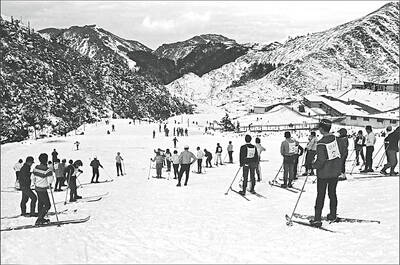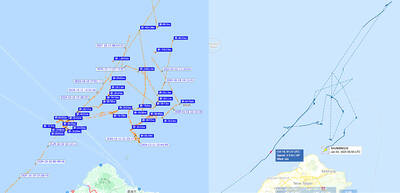The New Power Party (NPP) yesterday unexpectedly withdrew from what had been a fairly smooth cross-caucus negotiation effort on the Cabinet’s proposed amendments to the Labor Standards Act (勞動基準法).
Following more than 50 hours of hunger strike by NPP lawmakers in front of the Presidential Office Building in Taipei against the Cabinet’s proposals, the NPP submitted draft amendments that were more or less in line with the Cabinet’s.
The NPP agreed to raise the maximum number of consecutive working days from six to 12 and conditionally lower the minimum rest time between shifts from 11 hours to eight, but added a mechanism that would allow individual employees to refuse to work overtime.

Photo: Liu Hsin-de, Taipei Times
According to the NPP’s new proposals, businesses seeking to raise the maximum number of consecutive working days and lower the rest time between shifts would have to seek approval from its supervising agencies, the Ministry of Labor and the Legislative Yuan as well the respective unions.
Individual workers would still be able refuse their employers’ request even if the employer has the approval of the necessary agencies and unions.
The NPP’s proposals were understood to be a middle ground on Cabinet’s proposals to ease overtime rules, and the negotiations went on clause-by-clause for four hours.
However, as the negotiations were about to resume after a break, NPP Executive Chairman Huang Kuo-chang (黃國昌) announced that the party was withdrawing from the negotiations.
The Executive Yuan had resisted the NPP’s proposals, and the negotiation process was just a “formality” to smooth the way for the wholesale passage of the Cabinet’s amendments, he said.
Huang’s announcement shocked the other lawmakers and Cabinet officials.
Agreements made during cross-caucus negotiations have to be signed by all parties to be effective, and the NPP’s withdrawal meant that no agreement is now possible.
That means the Cabinet amendments might have to be put to votes during the plenary legislative session and approved with few changes.
Democratic Progressive Party (DPP) Legislator Lin Chun-hsien (林俊憲) said the NPP’s action might have been caused by labor rights groups’ opposition to its own amendments after they had worked closely with the NPP to protest against the government’s labor legislation.
The timing of the withdrawal coincided with an early evening protest staged by labor advocates in Taipei Main Station aimed at disrupting train operations, and DPP caucus whip Ker Chien-ming (柯建銘) accused Huang of telling his assistant to organize the protest.
After attempts to convince the NPP to return to the negotiating table failed, the DPP, Chinese Nationalist Party (KMT) and People First Party (PFP) continued the negotiations, focusing on overtime calculations and annual leave mechanism.
KMT lawmakers proposed dozens of draft amendments, including one from Legislator Chiang Wan-an (蔣萬安) seeking to codify a requirement that employers pay employees for unused annual leave in accordance with overtime rates.
In addition, the KMT caucus also proposed increasing the overtime rate to 200 percent of a worker’s hourly wage if they were asked to work on “rest days.”
DPP Legislator Lin Shu-fen (林淑芬) proposed entitling employees working on “rest days” to four hours of overtime pay for working between one to four hours, but calculating overtime pay by the actual hours worked past four hours.
The act entitles workers to four hours of overtime pay for working less than four hours and eight-hours of overtime for working less than eight hours on “rest days.”
As of press time last night, the three parties had not reached an agreement.
The DPP had planned to complete the review of the labor amendments by tomorrow.

DEEPER REVIEW: After receiving 19 hospital reports of suspected food poisoning, the Taipei Department of Health applied for an epidemiological investigation A buffet restaurant in Taipei’s Xinyi District (信義) is to be fined NT$3 million (US$91,233) after it remained opened despite an order to suspend operations following reports that 32 people had been treated for suspected food poisoning, the Taipei Department of Health said yesterday. The health department said it on Tuesday received reports from hospitals of people who had suspected food poisoning symptoms, including nausea, vomiting, stomach pain and diarrhea, after they ate at an INPARADISE (饗饗) branch in Breeze Xinyi on Sunday and Monday. As more than six people who ate at the restaurant sought medical treatment, the department ordered the

A strong continental cold air mass and abundant moisture bringing snow to mountains 3,000m and higher over the past few days are a reminder that more than 60 years ago Taiwan had an outdoor ski resort that gradually disappeared in part due to climate change. On Oct. 24, 2021, the National Development Council posted a series of photographs on Facebook recounting the days when Taiwan had a ski resort on Hehuanshan (合歡山) in Nantou County. More than 60 years ago, when developing a branch of the Central Cross-Island Highway, the government discovered that Hehuanshan, with an elevation of more than 3,100m,

Taiwan’s population last year shrank further and births continued to decline to a yearly low, the Ministry of the Interior announced today. The ministry published the 2024 population demographics statistics, highlighting record lows in births and bringing attention to Taiwan’s aging population. The nation’s population last year stood at 23,400,220, a decrease of 20,222 individuals compared to 2023. Last year, there were 134,856 births, representing a crude birth rate of 5.76 per 1,000 people, a slight decline from 2023’s 135,571 births and 5.81 crude birth rate. This decrease of 715 births resulted in a new record low per the ministry’s data. Since 2016, which saw

SECURITY: To protect the nation’s Internet cables, the navy should use buoys marking waters within 50m of them as a restricted zone, a former navy squadron commander said A Chinese cargo ship repeatedly intruded into Taiwan’s contiguous and sovereign waters for three months before allegedly damaging an undersea Internet cable off Kaohsiung, a Liberty Times (sister paper of the Taipei Times) investigation revealed. Using publicly available information, the Liberty Times was able to reconstruct the Shunxing-39’s movements near Taiwan since Double Ten National Day last year. Taiwanese officials did not respond to the freighter’s intrusions until Friday last week, when the ship, registered in Cameroon and Tanzania, turned off its automatic identification system shortly before damage was inflicted to a key cable linking Taiwan to the rest of